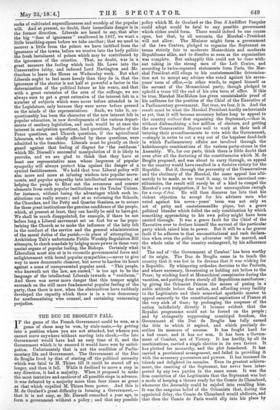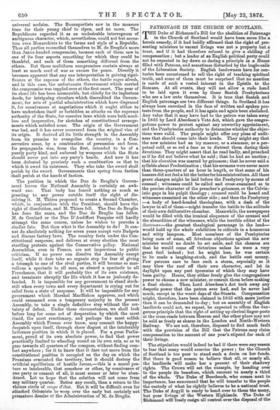THE DUO DE BROGLIE'S FALL.
'F the game of the French Government could be won, as a 1 game of chess may be won, by stale-mate,—by getting into a position where you are not attacked, but whence you cannot move anywhere without moving into check,—the late Government would have had an easy time of it, and the Government which is to succeed it would have won by antici- pation. Unfortunately that is not the condition of Parlia- mentary life and Government. The Government of the Due de Broglie lived by dint of staving off the political necessity which was fatal to M. Thiers till it could be staved off no longer, and then it fell. While it declined to move a step in any direction, it had a majority. When it proposed to make the most tentative and cautious of all possible steps in advance, it was defeated by a majority more than four times as great as that which expelled M. Thiers from power. And this is M. de Goulard's great difficulty in forming a Government,— that it is not easy, as Mr. Disraeli remarked a year ago, to form a government without a policy ; and that any possible policy which M. de Goulard or the Due d'Audiffret Pasqnier could adopt would be fatal to any possible government which either could form. There would indeed be one course open, but that, by all accounts, the Marshal - President will not allow. The Minister might form a government of the two Centres, pledged to organise the Septennat on terms strictly fair to moderate Monarchists and moderate Republicans alike, and to dissolve as soon as the organisation was complete. But unhappily this could not be done with- out taking in the strong men of the Left Centre, and according to twice-repeated statements from Paris, the Mar- shal President still clings to his unstatesmanlike determina- tion not to accept any adviser who voted against his seven- years' term of office,—in other words, to regard himself as the servant of the Monarchical party, though pledged to uphold a truce till the end of his own term of office. If this be true, Marshal MacMahon has given unmistakable proof of his unfitness for the position of the Chief of the Executive of a Parliamentary government. But true, we fear, it is. And the result must be what the Marshal President hardly understands as yet, that it will become necessary before long to appeal to the country without first organising the Septennat,—that is, without disfranchising a few million of electors, and getting the new Conservative Mayors well to work at their task of tutoring their arrondissements to vote with the Government, —simply in order to cut a way out of the hopeless dead-lock in which Parliamentary affairs are involved through the kaleidoscopic combinations of the various party-atoms in the Assembly. We, for our parts, think there is little doubt that even after all the doctoring of the constituencies which M. de Broglie proposed, and was about to carry through, an appeal to the country would have resulted in a decisive victory for the Republic. But if, through the perversity of the Conservatives and the obstinacy of the Marshal, the same appeal has ulti- mately to be made, as we trust it may, to the unrevised con- stituencies, the result will surely be of a kind to compel the Marshal's own resignation, if he be not unscrupulous enough for a coup d'e'tat. He will then discover too late that his violent objection to accept for his advisers men who voted against his seven - years' term was not only an act of petty and unstatesmanlike pique, but a grave political blunder which foiled the only combination by which something approaching to his own policy might have been carried through. It was a grave fault for the Chief of the Executive ever to declare himself the servant of the particular party which raised him to power. But it will be a far graver fault if he adheres to that unconstitutional and rash declara- tion when even the policy he advocates will be marred, and the whole calm of the country endangered, by his adherence to it.
The end of the Government of Combat' has been worthy of its origin. The Duc de Broglie came in to teach the country that it was but in its dreams that it was wishing for a Republic. By whispering orthodox doctrine to the Prefects, and where necessary, threatening or holding out bribes to the Press; by winking hard at Monarchical conspiracies during the vacation, and putting down sternly all Republican manifestoes ; by giving the Orleanist Princes the means of posing in a
noble attitude before the nation, and affording every facility to the Legitimists and their somewhat apathetic master to
appeal earnestly to the constitutional aspirations of France at the very nick of time; by prolonging the suspense of the nation indefinitely directly it became evident that the
Royalist programme could not be forced on the people ; and by stringently suppressing municipal freedom, the Government of the Due de Broglie has fully earned the title to which it aspired, and which precisely de- scribes its measure of success. It has fought hard for a bad cause, and it has not won. It has been a Govern- ment of Combat, not of Victory. It has hardly, by all its
machinations, carried a single election in its own favour. It has plotted for monarchy, and the plot foundered. It has carried a provisional arrangement, and failed in providing it
with the necessary guarantees and powers. It has incensed its friends and delighted its enemies. Even its greatest achieve- ment, the enacting of the Septennat, has never been inter- preted by any two parties in the same sense. It was the firm conviction of the Legitimists that the Septennat was but a mode of keeping a throne ready for the Comte de Chambord, whenever the Assembly could be cajoled into recalling him. It was the sanguine belief of the Orleanists that, during the
appointed delay, the Comte de Chambord would abdicate, and that then the Comte de Paris would slip into his place by
universal acclaim. The Buonapartists saw in the measure time for their young chief to ripen, and no more. The Republicans regarded it as an undesirable interregnum of ambiguous character, which, nevertheless, could not but accus- tom even Monarchists to the forms and style of a Republic. Thus all parties reconciled themselves to M. de Broglie's more than Janus-headed compromise, because each of them saw in one of its four aspects something for which they could be thankful, and each of them something different from the others. But these multiform compromises contain always at least as much seed of war as excuse for peace. Directly it becomes apparent that any one interpretation is gaining signi- ficance at the expense of the others, the battle rages afresh, and in this case, the unfortunate Government which carried the compromise was toppled over at the first onset. The year of its short life has been memorable, but chiefly for its inglorious deeds, for intriguing circulars which discredited the Govern- ment, for acts of partial administration which have disgraced it, for connivances at negotiations which it ought either to have undertaken itself or forbidden as attacks on the supreme authority of the State, for coercive laws which were both need- less and inoperative, for sketches of constitutional arrange- ments which satisfied none. The origin of the Government was bad, and it has never recovered from the eriginal vice of its origin. It derived all its little strength in the Assembly from its promise to evangelise the country, in a Con- servative sense, by a combination of persuasion and force. Its propaganda was, from the first, intended to be of a purely party kind, and enforced by weapons which the State should never put into any party's hands. And now it has been defeated by precisely such a combination as that to which it owed its existence. They who take the sword shall perish by the sword. Governments that spring from faction shall perish at the hands of faction.
The position in which the Due de Broglie's Govern- ment leaves the National Assembly is certainly an awk- ward one. That body has feared nothing so much as granting to any power outside itself the right of dis- solving it. M. Thiers proposed to create a Second Chamber, which, in conjunction with the President, should have the right of dissolution, and M. There fell. The Due de Broglie has done the same, and the Due de Broglie has fallen. M. de Goulard or the Duo D'Audiffret Pasquier will hardly attempt the same course, unless he wishes to provoke a similar fate. But then what is the Assembly to do ? It can- not do absolutely nothing for seven years except vote Budgets and discuss factory laws. The country frets under the Con- stitutional suspense, and delivers at every election the most startling protests against the Conservative policy. National Assemblies, even in France, are not impervious to public criticism. If no power can dissolve the Assembly except itself, while it dare take no organic step for fear of giving a triumph to one of the rival parties, it will become so mar- vellous a spectacle to all men, so absurd a spectacle to all Frenchmen, that it will probably tire of its own existence, and terminate abruptly the life which it has so jealously de- fended. It is impossible for any government to stand stock- still when every town and every department is crying out for relief from a state of suspense. It will be impossible for any government which Marshal MacMahon approves, and which could command even a temporary majority in the present Assembly, to take a single definitive step without the cer- tainty of defeat. Under these circumstances, we shall look before long for some act of desperation by which the most timid, the most reactionary, and perhaps the most selfish Assembly which France ever knew, may commit the happy- despatch upon itself, through sheer disgust at the intolerably ludicrous position in which it is placed. For a great Parlia- ment, proud of its own absolute power, to find that power practically limited to wheeling round on its own axis, so as to gaze towards all quarters of the compass, without finding com- fort anywhere ; for it to know that it dare not move from the constitutional position it occupied on the day on which the Prussians evacuated the territory, lest it should destroy the artificial equilibrium of hostile forces,—this is a moral pos- ture so intolerable, that somehow or other, by connivance of one party or consent of all, it must sooner or later be aban- doned. Let us hope that the solution will not come from any military quarter. Better any result, than a return to the vicious circle of coups d'e'tat. But it will be difficult even for attached Orleanists to weep over the early but certainly not premature demise of the Administration of M. de Broglie.



































 Previous page
Previous page